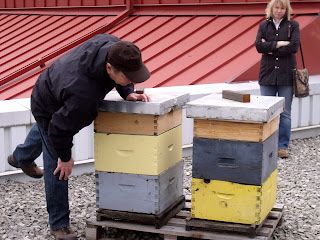The War Inside:
By: Christine
McFarlane
RING…RING…RING….
I hear you say, “Hello?”
“Your favorite
person is coming over,” you tell me two minutes later. I can tell you are
feeling a bit tense. I can see it in your face. It’s in the way you crinkle
your eyes, the nervous movement of your hand as you push your glasses further
up onto your face and the way that you’re trying to joke with me. That’s the
way it is with us, joking even in moments of seriousness. There’s nothing wrong
with joking, but sometimes I don’t know how to take it.
“Who’s coming
over?” I ask. I can feel my stomach begin to churn, and my heart going KA THUMP….KA
THUMP….KA THUMP. I hear you say
“Your ex mother,
she’ll be here tomorrow.”
Well, you really
don’t say that, you say the person’s name. I don’t want to name her here, but I
guess I have, haven’t I? Just check the two lines above this. I struggle with
what you have just said; in fact I would say there is a downright war going on
inside my head.
I tell people I’ve
closed that door and I’m moving forward, but really…. I can’t let go of this
woman who caused me so much pain in my past. Even now, when I almost
thirty-nine, and she hasn’t been in my life since I was ten years old.
I jump from the
cold hard chair that I’m sitting in. It almost turns over, as my feet hit the
ground, but I turn around and slowly put it back on its four legs.
“I can’t be here,”
I mutter.
“I can’t be
here,” I say a little louder and with as much conviction as I can muster up. I
look around me, my gaze falling on books, averting to an eraser that is lying
under the desk in which you sit. A war of emotions rage inside, my thoughts
start tripping over each other.
“I have to
leave, I can’t be here.” I say again,
“Where am I
going to go? Should I go to Tim Horton’s, grab a coffee? I ask. I laugh inside because I am thinking “yeah
right, an extra large coffee is going to just do you wonders.”
“Its okay
Chrissy” you say
“No its not” I
argue inside my head.
The woman I’ve
let myself be afraid of even after all of these years, will be here in this
very room I am standing in.
I’ve been told
so many times, that I just need to let go, that I shouldn’t give someone so
much power over myself, and over my emotions, but I do with this woman. I don’t
understand why. Well, maybe I do. On a very intrinsic level, I have always
wanted a mother, and I have always wanted this woman to say
“Yes Christine,
I was wrong.”
But I know; I
cannot make my adoptive mother or my adoptive father make this admission.
There’s a
downright war going on inside, but I know I must hold my head up high, and somehow
learn to let this go, because I can’t let this kill me anymore.
(this is a small part of a work in progress, stay tuned!)














